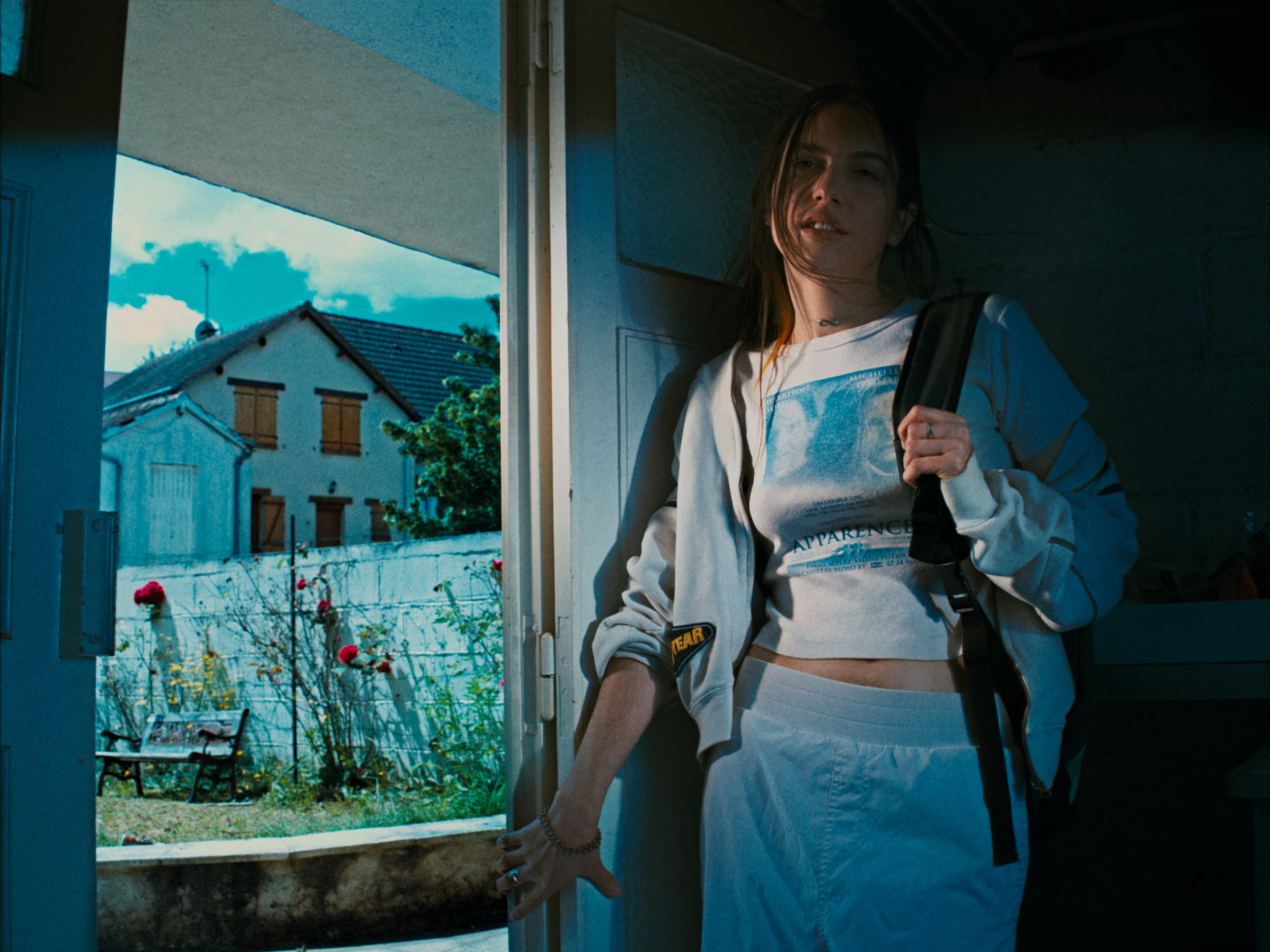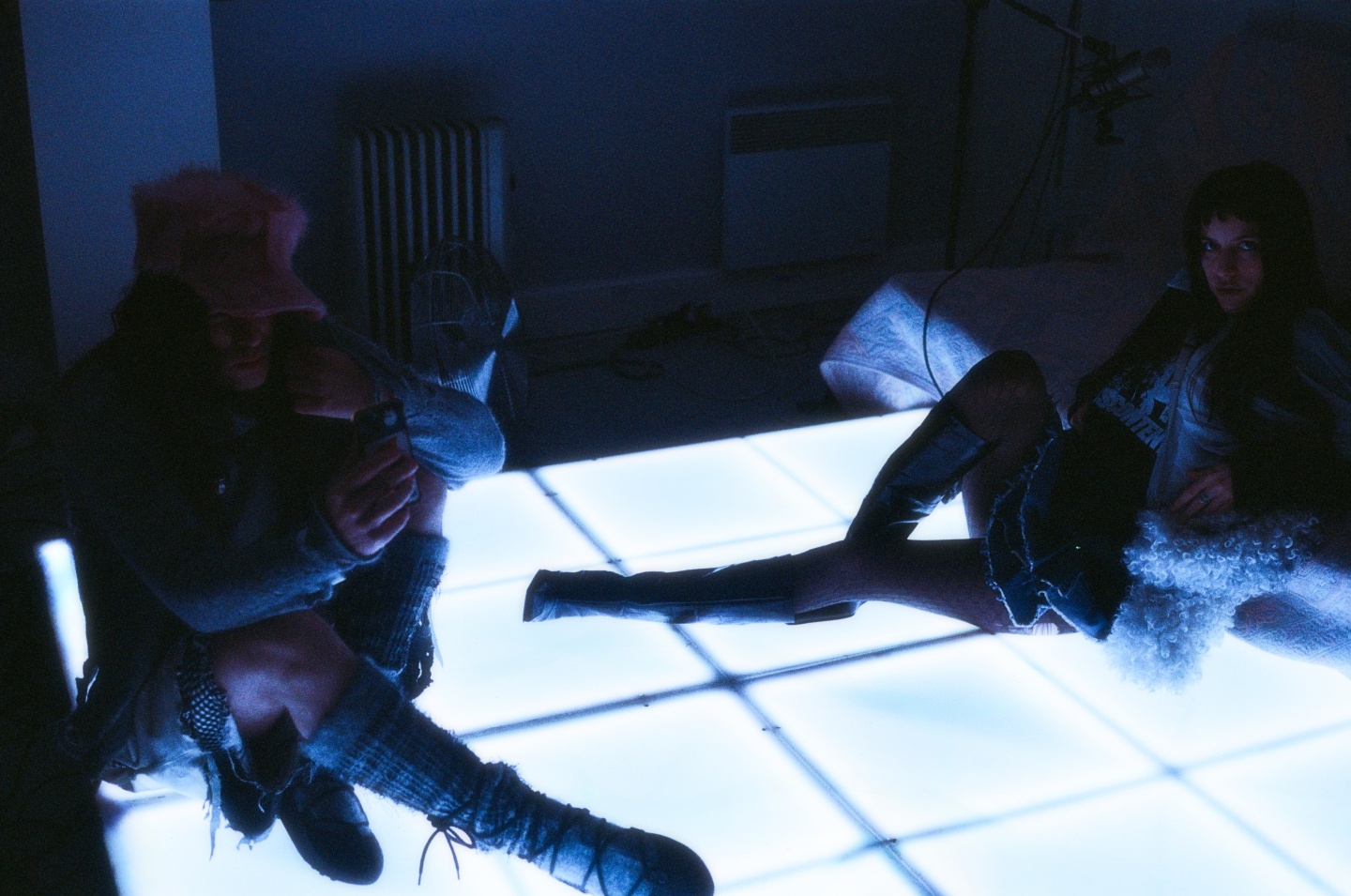Choke Enough, working with Bladee & her love of loops”>
Ariane Kiks
In the winter of 2022, Oklou wrote the first demo of her new album Choke Enough. After years of campaigning, promoting, and living inside Galore, her fantastical and emotionally intense debut project, she’d finally begun to feel her creative mind clear. She was on vacation with a new boyfriend, facing the fresh uncertainty of life when she sat down and recorded its title track, singing the lyric, “If I choke up now, will this life grant me the space?” “What is my experience at this moment,” she remembers asking herself at the time. “What path am I supposed to be taking?”
After years of churning out avant club loosies and the sumptuous synth pop tracks of 2020’s Galore, Oklou — the French electronic artist born Marylou Maniel — found herself stumped by her new album. Galore was written and submitted in the span of a few months. Her newest, out February 7, took closer to two years. There was no eureka spark moment, she says on a recent January morning, tucked in the middle of a cozy couch in a friend’s apartment in downtown Manhattan. Instead, it was an album that discovered itself as she created. “Many things changed in my alchemy, in my brain.”
This hardscrabble, transformative process made Choke Enough into an album of big questions, its music meticulously tinkered to glide into the brain with as little friction as possible. Her existential bout – spurred by age, everyday ennui, and changes within herself – is swathed in glossy beats scientifically engineered to induce hypnosis, a separate but parallel artistic study.
Maniel’s pop songs have always felt like intricately crafted puzzle boxes but her newest are exceptionally exquisite. The guitar work on “blade bird” flits like a mechanical dove, while processed woodwinds on “obvious” communicate its own folklore. The fact that they also feel like her most approachable yet — like on “Family and Friends” on which it sounds like she’s singing about starting a family — doubles the gratification. And it seems all her chipping away at these things have helped resolve some of her initial inquiries to the universe. At the start of our conversation, she hugs a pillow over her tummy and tells me she’s pregnant, something she discovered soon after completing her album.
Getting deep about her love of loops, drumless pop songs, and getting older and why she’s not afraid of aging, Oklou broke down the making of Choke Enough for The FADER.
The FADER: On “family and friends,” I feel like there’s a lyric about motherhood. You sing, “If I ever cradle my belly, stepping into the fantasy, will I wanna go back in time.”
OKLOU: Yeah that’s really true. Well, [when I wrote] the lyrics for “Family and Friends” that was far from thinking I was gonna be a mother in the next year. All the tracks from the album were done in September, and I got pregnant in September.
Was starting a family something you’d generally been thinking about?
It’s not so much about starting a family, but [the song] definitely holds thoughts around the options that are being presented to me as a human being, as a woman, as an artist. It holds a lot of questioning. I start the song by talking about a very precise memory I have of a conversation with a teacher that was around what you wanna do in life and what you’re supposed to do in life and what it means to use your qualities. I use this as a jumping off point for the rest of the track.
When you get older, these questions you asked yourself when you were younger gain so much more weight.
To be fair, my spirit when I was younger felt more free from these questions than these last few years for me. I felt more the weight of these options recently in my life, than when I was 19. After my last project, which was emotionally draining, very intense, very focused, very precise, there’s many things in my life that have changed. I think for a natural reason just because I’m a growing up human. But, eventually I had to write lyrics and I can only talk about my life. So if my experiences are the inspiration, what is my experience at this moment? I was trying to answer that question in this album.
I read that originally the album started as you wanting to make dance music, but then you changed your mind.
Because I didn’t achieve that. Well, I’ll tried but…
What did you end up pivoting to?
I went where my hands and my brain was able to do on Logic. I initially indeed had this ambition of having tracks that would be sounding like “Choke Enough” for 13 tracks. And I couldn’t find any other synth line in my computer that would be making the cut. After a few months of gathering pieces of little demos I had and starting to work with my friend and co-producer Casey MQ, I did a selection of things that I thought [fit] the criteria: What is touching me? Moving me? What do I enjoy hearing in these bits of music?
What did you enjoy hearing? How would you put that into words?
What connects them all, for me, is the fact that I wanted to have fun, work, and take as the basis of the tracks this idea of a loop that I could be listening to forever. Just because I think it sounds close to perfection. Shorter patterns and this idea of a cycle repeating itself forever and ever, and how I can build a pop song on top of that. I’ve always been very drawn to loops in general. Me and the friends I made along this past 10 years in music, it’s something we share, this love and interest for loops and for any type of music that works towards loops: Ambient music, of course, [and] William Basinski; the [Chuck Person’s Eccojam’s Vol. 1] pieces from Daniel Lopatin from [2010]. And then obviously all the culture around beat making. For me, this focus around my use of my own loops, it’s a way for me to connect the dots between all these tracks.
 Choke Enough, working with Bladee & her love of loops”>
Choke Enough, working with Bladee & her love of loops”>
Gil Gharbi
“The basis of the tracks [is] this idea of a loop that I could be listening to forever. Just because I think it sounds close to perfection.”
It really shapes the listening of the songs. You get lost in them very easily. You’ve also said that you want to make pop music without drums because “you can find power through other things.” Tell me more about that philosophy.
I hope I’m not gonna get lost because I have many things to say. First of all, I think the line I draw between power and drums is not because I believe it really exists, but it’s just an observation that I have from people talking about music. “Where is the kick? Oh, you should put a kick.” Usually I know what it means: they’re looking for a sensation. And I understand it’s pretty natural, it’s physical, it reminds [them of] the heartbeat. And also, I think I’ve seen attitudes and behaviors around things being as loud as possible, which is great, but like specifically, it has to be as loud as possible and without any nuances. I think that I am impressed and passionate about music that makes me feel empowered when it’s using other tricks than the actual slap of a percussive instrument.
I’m so interested in that process because I grew up playing acoustic instruments and listening to a lot of classical pieces. It’s something I have mixed feelings about, but I recognize now is what it has taught me in terms of expressing strong energies, whether it’s violence, whether it’s anger, whether just wanting to feel empowered or manifesting power, with just the cello. I am just interested in trying to convey these energies within what harmonies and melodies and the work around the sonic elements of all of these choices. Like a very popular example, “Adagio [for Strings]” by Samuel Barber. Very well known. It’s striking! It’s heartbreaking. But it’s so slow and there’s so little things happening in the end. I guess I’m interested in these tools.
Are you listening to classical music often?
I have to admit ever since I started working on the album, I’ve been listening to very few music actually. There’s one playlist I’ve been listening to on Spotify which is mainly just ’70s music of Japanese composers doing new age stuff. I really like that.
How did you know you wanted Bladee to be on the record?
It’s been a while actually that I wanted to do something with either him or Ecco2K, who I’ve been a big fan of also for a while. We actually met a few times and you know, quick exchanges, “Ah, we can do something together.” When I was writing the album in Los Angeles, [Casey MQ and I] we went to see a show of Drain Gang. I was really touched by the commitment of the fans. I think it gave me the impulse to actually write to [Bladee and Ecco2k]. But Benjamin was the one to answer my proposition.
What’s coming up for you this year? Obviously you have this other project you’re working on…
Two releases this year! [laughs] Well, the album is the first big thing which I’m very excited about. And then [I’ll] focus on how I’m gonna share this music with people. I work with a stylist, his name is Pierre, and we’ve been working on my character for this new album. I think I wanted to get back to something a bit more real in the aesthetic than what I’ve been exploring in these last years. [Galore] was really fantastic and witchy. I need to get back on Earth a little bit, and putting my vision on, “What is actually going on?” I’m [in my] 30s.
I’m turning 30 this year too.
Oh really? I’m going to turn 32 in April.
Did you go through a crisis?
Well, I don’t think I’m scared of aging in general cause I don’t believe in the young supremacy. I think it’s great to get old. In my personal story [there’s] something going on inside of me, but it’s really not age-related, I think. What’s cool when you age is that everything around you ages as well. So, you’re not alone.




